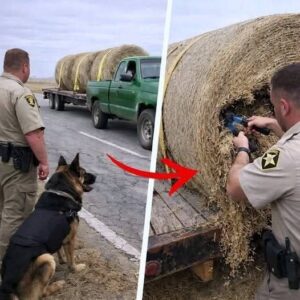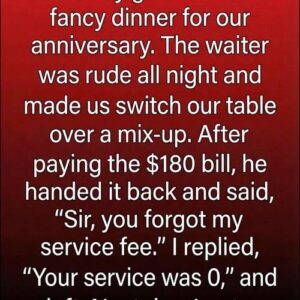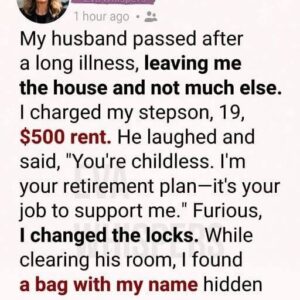I was seven months pregnant, broke, and barely holding it together when I saw him for the first time—the poor old man with tired eyes, hunched shoulders, and a scruffy dog pressed close to his leg as if it were the only thing anchoring him to this world.
It had been a long, exhausting day already. My back ached constantly, I was out of breath from simply walking across the parking lot, and the grocery list in my hand looked more like a cruel joke than something achievable with the few bills I had left in my wallet.
My husband, Tyler, and I were scraping by after he had been laid off from his construction job. I was working part-time at a call center, but the hours weren’t enough, and between rent, utilities, and preparing for the baby, we were drowning.
I remember standing in the store aisle staring at a pack of diapers, calculating and recalculating whether I could afford them if I skipped out on the jar of peanut butter or the loaf of bread. That’s when I noticed him at the register.
The old man looked out of place among the busy shoppers rushing through the line. His clothes were worn thin, his coat frayed at the edges, and his hands trembled as he fumbled with a pile of coins and crumpled bills.
The cashier’s expression was impatient as she rang up a small bag of rice, a can of beans, and a big bag of dry dog food.
“I’m sorry, sir, but you’re short,” she said, her voice flat, already ready to move on.
The man’s face crumpled in quiet defeat. He pulled the can of beans aside and asked, almost in a whisper, “Is it enough now?”
The cashier sighed. “You’re still short by three dollars. Do you want to put back the rice too?”
My chest tightened as I watched him glance down at the dog at his feet, a scruffy mutt with soft eyes and ribs showing under its fur. He reached for the rice, clearly about to give it up. The dog wagged its tail anyway, completely unaware of the sacrifice.
Without thinking, I stepped forward. “Wait,” I blurted, my voice louder than intended. Both the man and the cashier turned toward me. I held out the twenty-dollar bill I had been clutching like my life depended on it. “Here. Cover it with this.”
The old man’s eyes widened. “No, no, I can’t—”
“Please,” I said, cutting him off. My throat was tight, and I could feel my baby kick inside me, almost as if reminding me what compassion meant. “Take it. Get your food. And keep the change.”
The cashier looked relieved to finally resolve the situation. She punched in the bills quickly, bagged the items, and pushed them across the counter. The old man’s hands shook as he picked them up. He turned to me slowly, his eyes shining with tears he didn’t seem to know how to hide.
“Bless you, child,” he whispered. His voice cracked. “You don’t know what this means.”
I smiled weakly, though inside I was panicking about my own groceries. That twenty had been my safety net, my cushion against the uncertainty of the week. But watching him shuffle out of the store, the dog glued to his side, I felt oddly lighter, as though I had given away something more than money—I had given away despair.
I managed to buy a few essentials with the coins I had left, then headed home to the small apartment Tyler and I shared. When I told him what happened, he shook his head, a mixture of frustration and admiration in his eyes.
“Babe, we don’t have twenty dollars to give away,” he said, rubbing his forehead. “We’re barely hanging on as it is.”
“I know,” I admitted softly. “But he looked like he hadn’t eaten in days. And his dog… I just couldn’t walk away.”
Tyler sighed heavily but pulled me into his arms. “That’s why I love you. You’ve got a heart too big for your own good.”
That night, I went to bed hungry but oddly at peace.
The next morning, everything changed.
I woke to a knock at the door—sharp, deliberate knocks that echoed through the tiny apartment. My first thought was that it was the landlord demanding rent again. My stomach twisted as I shuffled to the door, bracing myself for confrontation.
But when I opened it, my breath caught in my throat.
There, on the doormat, sat a large cardboard box, neatly sealed and tied with twine. On top was a folded note. I glanced down the hallway, but it was empty—no footsteps, no retreating figure, nothing but silence.
Heart pounding, I bent down and picked up the note. In shaky handwriting, it read:
“For the angel who helped me when I had nothing. May this help you and your little one more than you know. With all my gratitude – Thomas (and Buddy).”
My knees buckled, and I sat right there on the floor, staring at the box. Carefully, I pulled the twine and lifted the flaps open.
Inside was food. Not just a little food, but piles of it. Cans of vegetables, bags of rice and pasta, jars of peanut butter, boxes of cereal, even baby formula and diapers. Nestled on top was a small envelope, and inside it was two hundred dollars in crisp bills.
I gasped, covering my mouth with my hand. Tears blurred my vision. This had to be a mistake. How could that old man, who couldn’t even afford a bag of rice, leave something like this for me?
Tyler came running when he heard me crying. When he saw the box, he froze, then crouched down beside me, sifting through the items in disbelief.
“Where did this come from?” he asked.
“The old man,” I whispered. “Thomas. It must have been him. But how? He couldn’t even pay for his groceries yesterday. How could he—”
We sat in silence, overwhelmed, until Tyler noticed a second folded paper taped to the inside of the box. He opened it and read aloud:
“I wasn’t always poor. Life took turns I never expected. I lost my wife, then my home, and finally my health. All I had left was my dog, Buddy. He’s been my only family. Yesterday, when you helped me, you reminded me I still mattered. That kindness is worth more than money. What you didn’t know is that I had some savings hidden away, money I had been hoarding for fear of worse days. But seeing you, heavily pregnant and still giving away your last bit to help a stranger… I realized I was hoarding for no reason. You gave me hope. Now I give it back to you. Please accept this, for you and your child. And know that in helping me, you may have changed more lives than you realize.”
By the time Tyler finished, I was sobbing uncontrollably. I pressed my hands to my swollen belly, feeling the flutter of my baby inside, and whispered, “We’re going to be okay.”
Over the next few weeks, the food from that box sustained us. The diapers and formula were put carefully away, ready for when the baby arrived. The money covered rent and utilities, buying us time to breathe, to plan, to survive.
But more than that, it changed something inside me. It reminded me that kindness has a ripple effect we can’t always see. One small act of compassion had come back to me in ways I could never have predicted.
A week later, I went back to the grocery store hoping to see Thomas again, but he never appeared. I asked around, described him to the cashier, even left a note with my phone number in case he returned, but no one knew where he had gone. It was as though he had vanished, leaving only the box as proof he had been real.
Months passed. I gave birth to a beautiful baby girl, healthy and strong. We named her Grace—because that’s what Thomas had given us. Grace in the middle of despair.
Sometimes, late at night, I would rock her to sleep and think of the old man and his dog. I imagined him walking with Buddy, maybe finding a warm place to stay, maybe finally resting after years of struggle. I hoped he knew what his gift had meant, not just the food or the money, but the reminder that humanity still existed in a world that often felt cold.
To this day, whenever I see someone struggling—counting coins at a register, choosing between feeding themselves or their pet—I think of Thomas. And I don’t hesitate anymore. Because I know that sometimes, the smallest act of kindness can change everything.
What I saw at my door that morning left me frozen, yes. But it also left me forever changed.
And I will spend the rest of my life making sure that ripple of kindness never stops.



